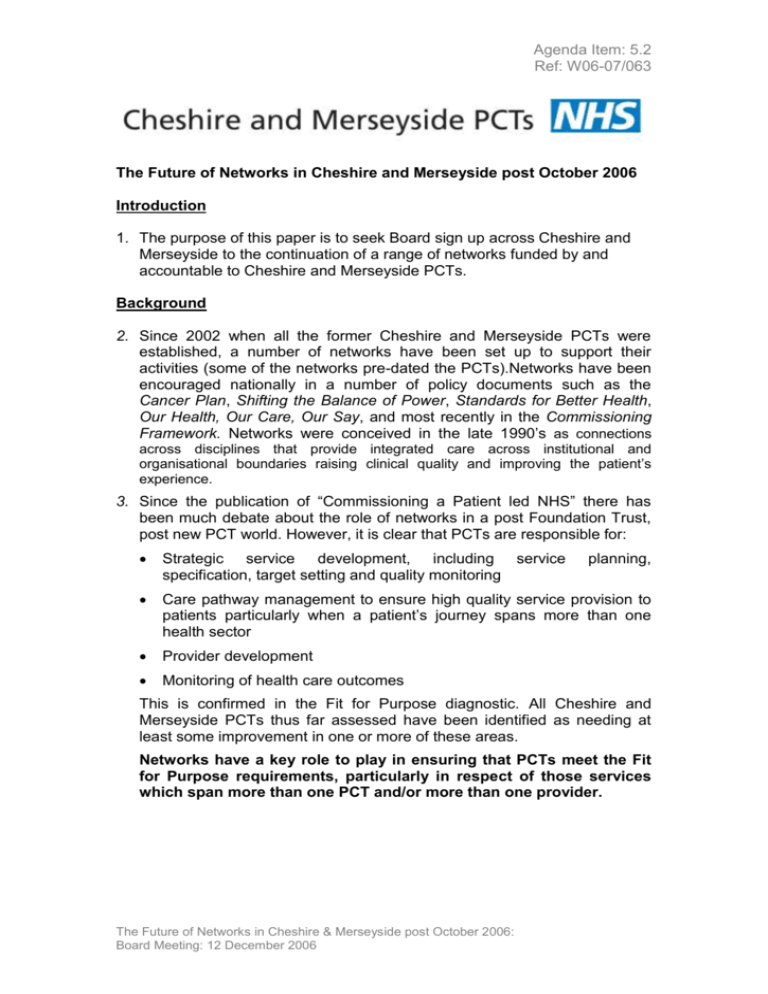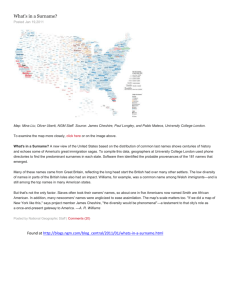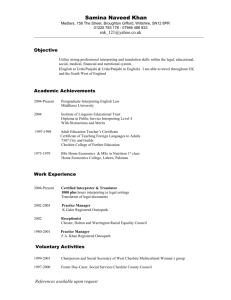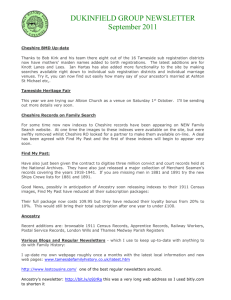here - NHS Wirral
advertisement

Agenda Item: 5.2 Ref: W06-07/063 The Future of Networks in Cheshire and Merseyside post October 2006 Introduction 1. The purpose of this paper is to seek Board sign up across Cheshire and Merseyside to the continuation of a range of networks funded by and accountable to Cheshire and Merseyside PCTs. Background 2. Since 2002 when all the former Cheshire and Merseyside PCTs were established, a number of networks have been set up to support their activities (some of the networks pre-dated the PCTs).Networks have been encouraged nationally in a number of policy documents such as the Cancer Plan, Shifting the Balance of Power, Standards for Better Health, Our Health, Our Care, Our Say, and most recently in the Commissioning Framework. Networks were conceived in the late 1990’s as connections across disciplines that provide integrated care across institutional and organisational boundaries raising clinical quality and improving the patient’s experience. 3. Since the publication of “Commissioning a Patient led NHS” there has been much debate about the role of networks in a post Foundation Trust, post new PCT world. However, it is clear that PCTs are responsible for: Strategic service development, including specification, target setting and quality monitoring Care pathway management to ensure high quality service provision to patients particularly when a patient’s journey spans more than one health sector Provider development Monitoring of health care outcomes service planning, This is confirmed in the Fit for Purpose diagnostic. All Cheshire and Merseyside PCTs thus far assessed have been identified as needing at least some improvement in one or more of these areas. Networks have a key role to play in ensuring that PCTs meet the Fit for Purpose requirements, particularly in respect of those services which span more than one PCT and/or more than one provider. The Future of Networks in Cheshire & Merseyside post October 2006: Board Meeting: 12 December 2006 Agenda Item: 5.2 Ref: W06-07/063 The proposal for Cheshire and Merseyside 4. There are currently 12 networks in Cheshire and Merseyside – Cancer, Cardiac, Child Health, Champs(public health), Critical Care, Diabetes, Neonatal Intensive Care, Maternity and Perinatal, Sexual Health, Teaching PCT, Renal, Urgent care/Emergency Services Action Team. It is proposed that all of these should continue – with the exception of ESAT which it is proposed should cease to function as a separate network from April 2007. PCTs in Cheshire and Merseyside remain committed to collaborating in respect of the planning of emergency services but Chief executives are of the view that they do not need a separate organisation to take this forward. Brief details of the work priorities of each of the remaining networks is attached at Appendix One. 5. Following a review of the Networks, and in particular accountability arrangements, it is proposed that a Network Board should be established which will be the key method of accountability between the networks and PCTs in Cheshire and Merseyside. The remit of the Board will be: To oversee the work of all networks in Cheshire and Merseyside which are established and funded by PCTs To ensure that the annual programmes of networks are consistent with the commissioning programmes of PCTs To sign off a business plan from each network To agree the annual budget for each network To promote synergies and encourage joint working between networks; to seek value for money and scope for greater efficiency at all times To consider requests for the establishment of new networks and the decommissioning of existing networks where appropriate It is proposed that the Network Board should meet twice a year in January and July. Membership would be all PCT C/Es in Cheshire and Merseyside. It has been proposed that the C/E of Wirral PCT should chair the Board. Decisions of the Board will be binding on all PCTs. If a Chief Executive cannot attend a Board meeting then they should field a Deputy who is able to commit to agreements in the Chief Executive’s absence. In between the two annual meetings of the Network Board, the Cheshire and Merseyside collective commissioning group/group of Commissioning Directors should ensure that network programmes continue to support PCTs’ commissioning intentions. 6. Each network will have a Chief Executive Chair/Sponsor who will represent the network at the Board meetings, as follows: Network Named Director/Lead Cancer Cardiac ChaMPs Child Health Critical Care Pat Higgins Margaret Leid Dawn Leicester Jonathan Smith Sarah Brookfield Chair/sponsor from October 2006 Kathy Doran Rebecca Burke-Sharples Allison Cooke Anita Marsland Kathy Doran The Future of Networks in Cheshire & Merseyside post October 2006: Board Meeting: 12 December 2006 Agenda Item: 5.2 Ref: W06-07/063 Diabetes Neonatal Intensive Care Maternity and Perinatal Sexual Health Teaching PCT Renal Nina Birt Maria Howard Jonathan Smith Simon Henning Cindy Freeman Jenny Scott Rebecca Burke-Sharples Anita Marsland Anita Marsland Leigh Griffin Derek Campbell Helen Bellairs The Funding of Networks from April 2007 7. Funding for 2006/7 is agreed and secured. There is £1.796m funding available recurrently for networks; expenditure is currently running at £2.312m, but will reduce following the winding up of ESAT. Current funding will then cover current expenditure It should be noted that some efficiencies have already been achieved. Three networks (cancer, Champs and sexual health) are now co-located; critical care is now sharing a network manager with the Cumbria and Lancashire network, has agreed data analyst support from the specialised services commissioning team and has released c£50k of unallocated resource back to specialised commissioning; the cancer network has had a 15% cut to its central allocation imposed by the Office of the SHAs and has made further savings in the region of £135k; cardiac networks have had a cut to their central allocation imposed by the Office of the SHAs. This will not affect the C&M network this year. There will need to be a discussion with the SHA regarding next year. 8. Given the need to ensure co-ordination across commissioning PCTs, to develop care pathways and provider collaboration for services which span more than one PCT and/or provider, and to develop quality measures for such services, it is proposed that PCTs give a commitment to continue to fund the networks as described above, incorporating the efficiencies which have already been achieved and charging the Network Board with the responsibility to seek further opportunities for efficiencies which would reduce the commitment for all PCTs. Conclusion and recommendation 9. The Board is invited to give its support to the continuation of a range of networks, to support key commissioning objectives, subject to the establishment of enhanced accountability arrangements through the establishment of a Network Board across Cheshire and Merseyside Kathy Doran Network Project Lead November 2006 The Future of Networks in Cheshire & Merseyside post October 2006: Board Meeting: 12 December 2006 Agenda Item: 5.2 Ref: W06-07/063 Appendix 1: Summary of work priorities for 2006/2007 The key work priorities for 2006/2007 as identified by the networks and collective working arrangements in Cheshire and Merseyside can be summarised as follows: Cardiac network NICU Policy advice for commissioners. Supporting the implementation of NSF Chapter 8 Cardiac Arrhythmias. Stable angina. Primary prevention. Facilitate the sharing of best practice. Promote compliance with DoH guidelines. Provide robust transport services within Cheshire and Merseyside. Increase nurse staffing levels. Education and ongoing continuing professional development. Development of protocols guidelines and audit. Support the ongoing development of the human milk donor bank. Sexual Health Delivery of LDP targets. Developing care pathways. Improving access to abortions. Increasing the uptake of Chlamydia screening. Tackling workforce issues. Prevention of sexually transmitted diseases. Improving communication. Child Health/Maternity and Perinatal Support and inform the development of new commissioning ‘footprints’. Lead a strategy to develop and expand the child health provider-side. Put in place a ‘fit for purpose’ performance management system Establish the first phase of a Peer Trainer/Mentor Scheme across C&M schools and communities. Develop the role of the Parent Carer Network as the custodians of best practice in relation to the planning and case management of services for children and young people with disability. Support Health in becoming a core leader in the establishing of Children’s Trusts. Engage Health in commissioning services, with partner agencies, which are discreetly designed for young people, to transform the “Transitions” experience. Implement the recommendations from the Risk Review, and strengthening the clinical safeguarding network. Create a strategy and capacity for working on the issues relating to children’s Unplanned Care. The Future of Networks in Cheshire & Merseyside post October 2006: Board Meeting: 12 December 2006 Agenda Item: 5.2 Ref: W06-07/063 Support the implementation of recommendations from the HCC Improvement Review of Children’s Hospital Care. Establish a new, inter-agency Network for the planning and delivery of services to young people with the most complex mental health needs (Tiers 3b & 4, or =). Establish a children’s Prescribing/Pharmacy Network. Establish an effective “Maternity Services” Network. Lead the strategic thinking about new approaches to an “Intermediate Community Child Health” service or pathway. Conclude the development work on a comprehensive children’s SARC service. Launch a new stream of work relating to excluded children and young people. Help ensure that Joint Investment Statements can be established in each C&YPP area, in time for the start of the 07/08 financial year. Implement a proactive Health contribution to an ambitious, children’s workforce plan. Establish a sound, joint information strategy, and make and effective implementation of its first phase. Bring the child health research community together into a more coherent network, which begins to respond to locally-identified priorities and needs. Advocate, in the NW and nationally, for the establishing of a common public health dataset for children, and the creation of a “Child Health Observatory” capacity. Critical Care Develop service improvement champions. Promote patient and public involvement. Develop care bundles. Provide commissioners and providers with information on changing acuity of illness. Promote accurate prescribing and administration of medication. Reduce the number of critical care transfers and delayed discharges. Ensure hospital wide systems are in place for the early identification of patients whose condition is deteriorating (outreach). Analysis of critical care transfers and bed capacity. ChaMPs Public Health Network • Support the delivery of PCTs’ and local authorities’ public health priorities and targets • Promote collaboration and cooperation between the NHS, local authorities and other organisations e.g. development of guidelines to make effective joint public health appointments, and reduce smoking prevalence and exposure to second-hand smoke • Facilitate an effective and accredited CPD programme for the public health workforce and hold the second ChaMPs conference The Future of Networks in Cheshire & Merseyside post October 2006: Board Meeting: 12 December 2006 Agenda Item: 5.2 Ref: W06-07/063 • Collaborate effectively with other networks by developing joint programmes and working groups (e.g. Cancer Network, Sexual Health Network, CHD through Heart of Mersey and the Children’s Network) • Develop and disseminate practice-based commissioning guidance to enable commissioners to effectively commission for health gain • Develop novel approaches in tackling health inequalities e.g. using social marketing to address childhood obesity and awareness of COPD • Develop public health workforce capacity and capability to deliver improvements in the health of the population and address inequalities e.g. implement a Health Trainers programme • Submit a joint bid to win DH funding to establish a regional Public Health Teaching Network to strengthen links between PCTs and academia • Engage health protection partner agencies in setting out a strategic direction and promoting opportunities for joint work and sharing good practice to protect the health of the population • Jointly organise with the Healthcare Commission a North West event for provider trusts and commissioners around achieving world class standards in public health • Implement a best practice procurement project through ChaMPs’ partnership in the EU Healthclusternet programme • Establish a joint working group on alcohol to develop effective strategies Teaching PCT Support business continuity during the organisational instability whilst functions, systems and structures are being established. Hold the ring on organisational intelligence around community and primary care education, helping to avoid “re-invention of wheels”. Work on educational development programmes that help organisations achieve performance targets. Provide education leads with a forum to challenge, be creative, share knowledge, special skills and information Work with and at the interface with other partner organisations including Higher Education, Social Services and the SHA. Facilitate the best use of educational resource so that economies of scale are achieved. Focus on embedding the ethos of learning and sharing between organisations. The Future of Networks in Cheshire & Merseyside post October 2006: Board Meeting: 12 December 2006 Agenda Item: 5.2 Ref: W06-07/063 Cancer Network Summary of key functions and anticipated outputs for 2006-2008 for the Cancer Network Strategic Direction and Leadership Engagement with all stakeholder organisations Clinical Engagement (and other professionals) Service Planning and Commissioning advice to PCTs Patient Pathway Development and Service Improvement Patient & Public Involvement Quality Assurance, accreditation and governance e.g. pathways, IOGs Information Dissemination and Communication Implementing national policy Workforce Development and planning Performance management e.g. Peer Review, CWT Through the Taskforce, (board) a number of key strategic objectives were agreed as part of the Network’s Service Delivery Strategy 2005-8. This included a number of overarching objectives e.g. reducing mortality, improving outcomes and delivering national targets. The following objectives have been approved and for the next 18 months the key areas will be : Continue implementation of action plans for NICE Improving Outcomes Guidance (IOG) in all cancers with full implementation in gynaecological, urological, upper gastro-intestinal, haematological cancers and supportive and palliative care. Prepare for peer review in haematological, urological and upper gastrointestinal cancers (November 2006), colorectal and head & neck cancers (May 2007). Implement remedial action plans resulting from peer review 2005. Develop action plans for NICE IOG in skin, brain, sarcoma and children’s and young people’s cancers. Achieve and sustain waiting time targets for all cancers. Develop plans to achieve two week access for all breast and colorectal referrals. Implement commissioning and governance frameworks for cancer. Implement the Bowel Cancer Screening Programme for C&M PCTs. Responding to the challenges re Commissioning patient led NHS – reshaping the portfolio of the network team to support the new organisations and demonstrate VFM whilst contributing to corporate savings targets. Supporting providers and commissioner on financial reforms for cancer services by strengthening links to host commissioners and host cancer centres Developing the Primary care cancer agenda – emphasis on health inequalities, early detection and prevention strategies linking with PBC Examine and audit care pathways focusing on in patient episodes of care in line with national direction (further guidance is expected from the National Cancer Action Team – Going Further on Cancer Waits) Develop plans to achieve two week access for all breast and colorectal referrals (a manifesto commitment and likely to be a part of above) The Future of Networks in Cheshire & Merseyside post October 2006: Board Meeting: 12 December 2006 Agenda Item: 5.2 Ref: W06-07/063 Implementing a comprehensive strategy on Patient information (part of Supportive and Palliative Care IOG for which Macmillan funding has been secured) Strategic development of patient involvement linking with other networks and PPI fora across Cheshire and Merseyside Workforce Development – supporting staff through changing roles, particularly nursing roles learning from the Integrated Cancer Care Pilots End of Life – mainstreaming this to all disease groups. Renal network Progress initiatives to address the need for additional capacity within renal services Inpatient bed requirements Central Cheshire / University of North Staffordshire Hospital HD expansion East Cheshire / Central Manchester HD expansion ISTC Haemodialysis expansion programme Nephrology Outpatient Demand and Capacity Plan Workforce Planning in renal services Implementation of the Cheshire and Merseyside Renal Transport Learning Set recommendations Address renal service priorities in implementation of the renal NSF Collate and analyse NSF baseline assessments Establish a detailed work programme for the Renal Strategy Group Update Cheshire and Merseyside Strategic Framework for 20082014 Paediatric Nephrology issues Development of an effective renal IT system Establish a network-wide IT system in order to submit national data to the Renal Registry UK and manage local clinical care. Formalise policies and guidelines for the Cheshire and Merseyside Renal Network Blood borne viruses / Hep B Vaccination Programme Transplantation including Immunosuppression and Organ Donor Marketing Plan Acute Renal Failure Management Conservative Management Home Haemodialysis Temporary Away From Home Dialysis Anaemia Management Cinacalcet prescribing Peritoneal Dialysis Development Early Referral of Chronic Kidney Disease Strengthening Communication with Patient Groups and Service Users Website Quarterly newsletter Strengthening links with Cardiac and Diabetes colleagues The Future of Networks in Cheshire & Merseyside post October 2006: Board Meeting: 12 December 2006 Agenda Item: 5.2 Ref: W06-07/063 Annual patient conference Meetings with directorate managers Engagement with PCT renal commissioners Regular contact with patient groups Sharing good practice events for clinicians and commissioners Renal SpRs education / training in commissioning Diabetes network Facilitate review and development of structured education in accordance with NICE Guidelines Facilitate and support local networks in achievement of Diabetic Retinopathy Screening Target Share learning and outcomes from Health Care Commission Review and National Diabetes Survey Communication Strategy – Provide regular information to local networks via web site and newsletters Facilitate forum for clinical engagement and sharing of good practice Develop consistent guidelines and protocols across the Region to support equity of service provision (ie Insulin Pumps) Develop strategy to support implementation of Children and Young People with Diabetes guidance Provide education and learning opportunities for local diabetes networks as identified Represent colleagues at the National Diabetes Support Team Meetings Facilitate participation in National Diabetes Audit and share outcomes to help improve service provision The Future of Networks in Cheshire & Merseyside post October 2006: Board Meeting: 12 December 2006







